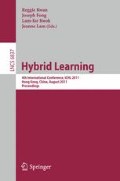Abstract
An economic approach of self-design instrument for audio devices is proposed to mix the voices of teacher and students such that interactive activities and cooperative learning can be efficiently performed during the lecture hour. For instance, during students running Teams-Games-Tournament (TGT) activity, their voices to response the clear and correct pronunciation about the competitive content are very important. As we know, TGT is one of classroom programs to address the problems of student values, student diversity, and student skills. Therefore, if we can provide a well-design audio environment, we believe that the TGT-related activities can be efficiently handled by the teacher to reach the purpose of TGT. In this self-design approach, two kinds of microphones are considered, one is wired microphone which is suitable for using in steady presentation and the other is wireless microphone which is suitable for using in mobile activities. In this study, we improve the traditional problem of the mixer to provide a low-cost and high scalable audio mixer. “High scalable” means that our system can plug in a variety of audio input devices including Bluetooth wireless microphone. Mainly, we use Bluetooth technology to solve the adaptive problem of multi-branch wireless microphones such that different channels of voices can be accepted in our self-design audio instrument.
Access this chapter
Tax calculation will be finalised at checkout
Purchases are for personal use only
Preview
Unable to display preview. Download preview PDF.
References
Chiang, L.C.: An Action Research on Integrating Information Technology with Cooperative Learning Strategies into Nature and Life Technology Teaching in Junior High School. Master’s degree. National Changhua University (2004)
Lee, J.S.: Action research in Science Experiments forCooperative learning to Elementary School. Master’s degree. National Hualien Teachers College (2003)
Lee, S.J.: Research of the Cooperative Learning Approach in Teaching Introduction to Commerce in the Vocational Senior High School. Master’s degree. National Changhua University (2005)
Chang, Y.W.: A Study of the Effects of Cooperative Learning on English Learning at Vocational High School. Master’s degree. National Changhua University (2003)
Williams, K., Harkins, S., Latane, B.: Cooperating Learning and Inclusion. Journal of Personality and Social Psychology 40, 303–311 (1981)
Johnson, D.W., Johnson, R.T.: Cooperation in the Classroom. International Book Company., Edina (1990)
Hsu, H.C.: Effect of STAD strategy on Motivations, Learning Strategies, and Academic Achievements of Junior High School Students. Master’s degree. National Changhua University (2006)
Wang, S.C.: Effect of Cooperative Learning Seventh Grader’s Motivation and Achievement on the Southern Area in Natural Science. Master’s degree. National Changhua University (2007)
Jung, W.G.: Op Amp Applications Handbook (2004)
The OP AMP, http://www.physics.arizona.edu/~haar/ADV_LAB/OP_AMP.pdf
Chen, Y.C., Tan, T.H., Wang, H.M., Tsai, W.H.: Performance Evaluation and Analysis of Mandarin Speech Recognition over Bluetooth Communication Environments. In: Proceedings of the 16th Conference on Computational Linguistics and Speech Processing (2004)
Author information
Authors and Affiliations
Editor information
Editors and Affiliations
Rights and permissions
Copyright information
© 2011 Springer-Verlag Berlin Heidelberg
About this paper
Cite this paper
Tsai, CY., Liao, YH., Su, MH., Yu, PT. (2011). An Audio Instrument Design for Improving Interactive and Cooperative Learning. In: Kwan, R., Fong, J., Kwok, Lf., Lam, J. (eds) Hybrid Learning. ICHL 2011. Lecture Notes in Computer Science, vol 6837. Springer, Berlin, Heidelberg. https://doi.org/10.1007/978-3-642-22763-9_34
Download citation
DOI: https://doi.org/10.1007/978-3-642-22763-9_34
Publisher Name: Springer, Berlin, Heidelberg
Print ISBN: 978-3-642-22762-2
Online ISBN: 978-3-642-22763-9
eBook Packages: Computer ScienceComputer Science (R0)

